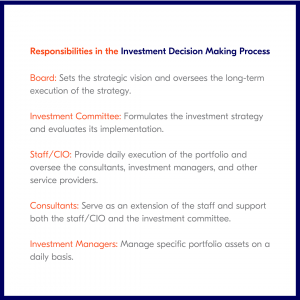I: Understanding the Roles & Responsibilities of a Board
Effective governance requires that boards focus their attention on their fiduciary responsibilities, including how the investment process is organized, implemented, and managed. Board members often do not have adequate processes to assist them with their fiduciary responsibilities. A successful approach begins with clearly defining each of the fiduciaries’ roles and responsibilities, thoughtfully structuring the investment committee, and employing processes to effectively implement the investment strategy.
This structure — and the reasoning behind it — should be communicated during board member orientation to ensure a thorough understanding of how these organizational practices impact the institution.
In order to effectively execute a strategy, roles and responsibilities need to be clearly defined. Poorly defined responsibilities and a lack of accountability can lead to inaction and confusion. This is especially true for organizations like nonprofits, or even public pension funds, where the board members are volunteers. These issues can also be found with retirement plan committees where members have other full-time responsibilities and can only meet periodically to review the plan.
Therefore, adopting a charter that defines the roles and responsibilities of the board, investment committee, staff/chief investment officer (internal or external), consultants, and investment managers is critical to ensuring accountability.

Board
The board has the ultimate fiduciary responsibility for the investment portfolio. Therefore, the board must ensure that appropriate policies are in place and that these policies are being effectively implemented. At board meetings, the focus should be on this oversight role and not simply reviewing short- term performance. Second-guessing portfolio decisions or offering investment opinions is not the role of the board. Rather, board members should ensure the policies adopted are being followed and the long-term investment plan is being implemented.
Investment Committee
The investment committee is responsible for taking the board’s strategic vision for the organization and developing an investment strategy to achieve that mission. Before devising the investment strategy, however, the investment committee needs to understand how it wants to accomplish its goals and therefore must embrace a shared investment philosophy. Without this philosophical underpinning, the committee risks taking a haphazard approach to investing. Once the committee has articulated a strategy and philosophy, its primary focus should be to ensure that the strategy is followed and to oversee the administration of the fund. The investment committee is also charged with meeting periodically (e.g., quarterly) to review the portfolio, review the investment team, and reaffirm the investment strategy and approach.
Staff / Chief Investment Officer
Staff typically has daily responsibility for administering the portfolio. For larger institutions, often a chief investment officer (CIO) serves in this capacity. Institutions unable to afford hiring an internal CIO should consider an outsourced CIO. Regardless of the structure, the CIO (internal or external) should be responsible for executing all investment decisions and serve as the primary contact for the portfolio’s investment managers, consultants, and custodians. Because of the different governance structures, clear delineation of roles and who has discretion for which decisions is imperative for effective execution.
Consultants
Investment consultants often are hired to assist the staff and investment committee in overseeing the investment portfolio. Their responsibilities may include:
- Providing recommendations and reports (e.g., asset allocation studies, investment manager research, and education) to assist in structuring the portfolio
- Monitoring the activities of each investment manager and investment fund
- Assisting in drafting the Investment Policy Statement
- Issuing quarterly performance reports
- Attending investment committee meetings and being available to offer necessary support and advice
These responsibilities will be significantly influenced by the depth of staff resources and committee expertise. Institutions with limited investment staff and modest committee member expertise understandably will rely more on consultants than institutions with large, dedicated staffs and substantial committee member expertise. In order to effectively utilize the skills of a consultant, roles need to be clearly defined and expectations plainly communicated.
Outsourced CIOs typically provide the same services as a consultant, with the additional responsibilities of supervising investment managers (with the discretion to hire and fire) and determining the appropriate asset allocations within the investment policy parameters.
Investment Managers
Investment managers are hired to manage specific mandates (e.g., large cap stocks, small cap stocks, international stocks, bonds, or real estate). In this role, they are responsible for the day-to-day management of their assigned portfolios. Although fairly straightforward, the investment managers’ roles and duties still must be well understood.
The first step to effective governance is understanding fiduciary roles and responsibilities, which should lead to better accountability. The next installment in this series will focus on how to assemble an investment committee and how to design and implement effective investment processes.
